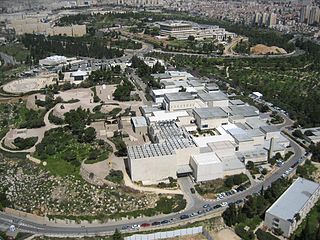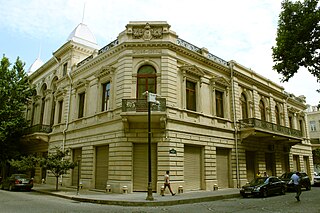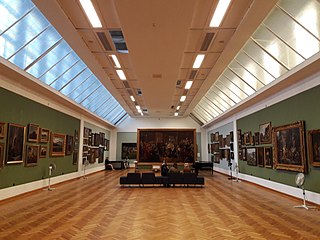
The Museum of the Order of St John in Clerkenwell, London, tells the story of the Venerable Order of Saint John from its roots as a pan-European Order of Hospitaller Knights founded in Jerusalem during the Crusades, to its present commitment to providing first aid and care in the community through the St John Ambulance Brigade and running an Ophthalmic Hospital in Jerusalem. The museum is a member of the London Museums of Health & Medicine.

Manolito Tolentino Mayo was a Filipino graphic artist, printmaker, avantgarde poet, sculptor, and art professor. His prolific career was brief – it lasted only a decade, as he died at the age of 28. He was one of the active young artists who experimented, collaborated, and exhibited art works in the thriving hubs of modernist and contemporary galleries and art associations in the Ermita district of Manila. He was also credited by his peers and art writers as the "Original Punk" of Philippine arts.

The University of Santo Tomas, officially the Pontifical and Royal University of Santo Tomas, Manila or colloquially as USTè, is a private, Catholic research university in Manila, Philippines. Founded on April 28, 1611, by Spanish friar Miguel de Benavides, third Archbishop of Manila, it has the oldest extant university charter in Asia and is one of the world's largest Catholic universities in terms of enrollment found on one campus. It is the main campus of the University of Santo Tomas System that is run by the Order of Preachers.

The Israel Museum is an art and archaeological museum in Jerusalem. It was established in 1965 as Israel's largest and foremost cultural institution, and one of the world's leading encyclopaedic museums. It is situated on a hill in the Givat Ram neighborhood of Jerusalem, adjacent to the Bible Lands Museum, the Knesset, the Israeli Supreme Court, and the Hebrew University of Jerusalem.

The National Museum (NM) is a public museum dedicated to natural scientific and historical collections of the Czech Republic, its history, culture and people, among others. The museum was founded in 1818 by Kašpar Maria Šternberg. Historian František Palacký was also strongly involved in the foundation of the museum.

Fernando Amorsolo y Cueto was a portraitist and painter of rural Philippine landscapes. Nicknamed the "Grand Old Man of Philippine Art," he was the first-ever to be recognized as a National Artist of the Philippines. He was recognized as such for his "pioneering use of impressionistic technique" as well as his skill in the use of lighting and backlighting in his paintings, "significant not only in the development of Philippine art but also in the formation of Filipino notions of self and identity."

The Ayala Museum is a museum in Makati, Metro Manila, Philippines. It is run privately by the Ayala Foundation and houses archaeological, ethnographic, historical, fine arts, numismatics, and ecclesiastical exhibits. Since its establishment in 1967, the museum has been committed to showcasing overseas collections and situating contemporary Philippine art in the global arena in a two-way highway of mutual cooperation and exchange with local and international associates. The museum was reopened on December 4, 2021, after a two-year renovation.

Staatliche Kunstsammlungen Dresden is a cultural institution in Dresden, Germany, owned by the State of Saxony. It is one of the most renowned and oldest museum institutions in the world, originating from the collections of the Saxon electors in the 16th century.

Maidstone Museum is a local authority-run museum located in Maidstone, Kent, England, featuring internationally important collections including fine art, natural history, and human history. The museum is one of three operated by Maidstone Borough Council. The building is Grade II* listed.

The Department of Asia in the British Museum holds one of the largest collections of historical objects from Asia. These collections comprise over 75,000 objects covering the material culture of the Asian continent, and dating from the Neolithic age up to the present day.
The University of Santo Tomas Graduate School is the graduate school of the University of Santo Tomas, the oldest and largest Catholic university in Manila, Philippines.
The Arts in the Philippines are all the arts in the Philippines, from the beginning of civilization to the present. They reflect a range of artistic influences on the country's culture, including indigenous art. Philippine art consists of two branches: traditional and non-traditional art. Each branch is divided into categories and subcategories.

Mario Parial was a multi-awarded Filipino painter, printmaker, sculptor and photographer. His works have been sold at Sotheby's.

The National Museum of History of Azerbaijan is the largest museum in Azerbaijan. It is located in Baku, in the former residential house of Azerbaijani oil magnate and philanthropist Haji Zeynalabdin Taghiyev. The museum was founded in 1920, following the Russian takeover of Baku, and opened to visitors in 1921.

The National Museum in Lublin is one of the oldest and largest museums in Eastern Poland, located in Lublin. It was created in 1914, and received its own building in 1923.

Ternopil Regional Art Museum is a museum in the north-central part of Ternopil, Ukraine. It was founded on 1 May 1991 on the base of the former art gallery — a department of museum of regional ethnography. The museum aims to research the stock, education, exposition, exhibition, methodical and restoration work. The museum collection includes paintings, graphics, sculptures, arts and crafts. Among the exhibits are icons of the 17th to 19th centuries, carvings of Johann Georg Pinsel and Anton Osinskyi. Permanent exhibition is based on historical and chronological order and represents the art of Ukraine and Western Europe.

The Saint James the Apostle Parish Church, also known as The Roman Catholic Church of Saint James the Apostle or commonly known as Church of Paete, is the only Roman Catholic church in Paete, Laguna, Philippines. Its patron saint is James the Apostle and his feast is celebrated every 25 July. The church is known for its huge and exquisite collection of images depicting the Passion of Christ, its century-old paintings and wooden images of saints.
Steve Cribb was an English disability rights activist, artist, collector and numismatist.

The Nasser D. Khalili Collection of Islamic Art includes 28,000 objects documenting Islamic art over a period of almost 1400 years, from 700 AD to the end of the twentieth century. It is the largest of the Khalili Collections: eight collections assembled, conserved, published and exhibited by the British-Iranian scholar, collector and philanthropist Nasser David Khalili, each of which is considered among the most important in its field. Khalili's collection is one of the most comprehensive Islamic art collections in the world and the largest in private hands.



















